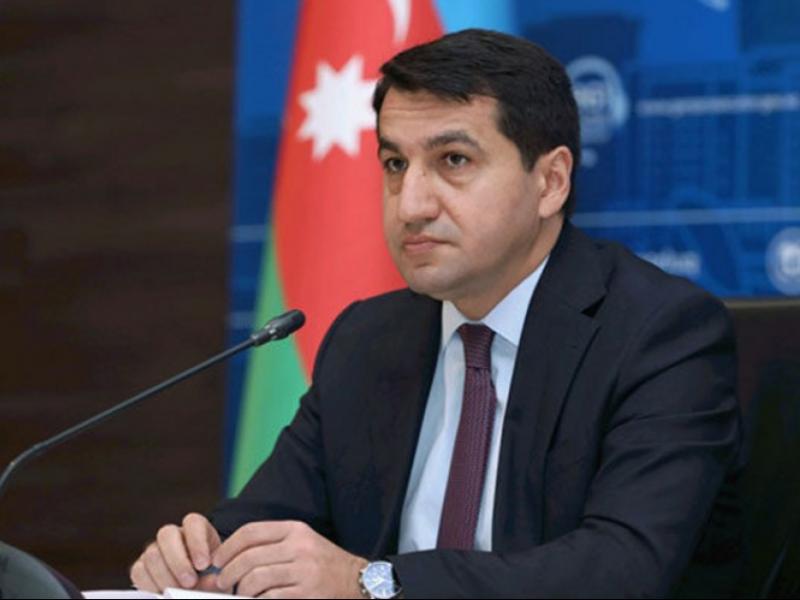German newspaper Berliner Zeitung publishes interview with Assistant to President of Azerbaijan Hikmet Hajiyev

The German newspaper Berliner Zeitung has published an interview with Hikmet Hajiyev, Assistant to the President of the Republic of Azerbaijan and Head of the Foreign Policy Affairs Department of the Presidential Administration.
The interview covers Hajiyev’s views on the peace treaty between Azerbaijan and Armenia, the Russia-Ukraine war, and the biased coverage of Azerbaijan by some European media outlets, including in Germany.
Emphasizing the opportunity to achieve lasting peace in the South Caucasus, Hikmet Hajiyev noted that there is currently no military confrontation or escalation between Armenia and Azerbaijan. He acknowledged that some disagreements remain, but dialogue to resolve them is ongoing.
“We are ready for peace and the transformation of the entire region,” said Hajiyev, highlighting that the peace agreement text was prepared by Azerbaijan and submitted to Armenia, with the core elements of the text already agreed upon - a positive development.
However, he stressed the importance of resolving certain details, particularly the fact that Armenia’s Constitution still contains territorial claims against Azerbaijan.
“We are eager to sign a peace agreement not only with the Armenian government but also with the Armenian people. We want the Armenian people to renounce all territorial claims against Azerbaijan by amending their Constitution,” he said.
Expressing confidence that no obstacle to peace would remain once this issue is resolved, Hajiyev described the OSCE Minsk Group’s decades-long mission as a complete diplomatic failure, noting its lack of results over 30 years and saying it should be "sent to the dustbin of history."
He added that Armenia had grossly violated international law by using force against Azerbaijan, occupying its territories, and ignoring UN Security Council resolutions for three decades. During the occupation, Armenian forces razed Azerbaijani cities and villages. According to comprehensive assessments based on UN criteria, the total damage is estimated at $150 billion.
Hajiyev noted that the Azerbaijani people have always aspired to return to their ancestral lands. Today, large-scale reconstruction is underway in the liberated territories, with over 50,000 Azerbaijanis already living, working, and studying in Karabakh and East Zangezur. He also pointed out that Armenians in Karabakh chose to leave the region, having refused to be part of the broad reintegration model offered by Azerbaijan.
The Assistant to the President also recalled that 250,000 Azerbaijanis who had lived for centuries on the territory of present-day Armenia were forcibly expelled from their homes due to the conflict.
He warned that a new wave of revanchist thinking is emerging in Armenia, with attempts to undermine the new regional status quo and youth being indoctrinated toward future conflict. Hajiyev stressed that the Armenian government must focus on domestic reforms, adding that constitutional reform is essential to prevent further instability.
The peace talks in Abu Dhabi were also discussed. Hajiyev described the talks as a constructive civil dialogue, noting positively that the peace process is now primarily in the hands of the two parties. He emphasized that Azerbaijan does not need external lectures on how to live in peace or coexist. Despite the absence of formal diplomatic ties, the negotiations with Armenia were productive.
Regarding the Zangezur corridor, Hajiyev said the question should be posed to Armenia. He explained that Azerbaijan has fulfilled its obligations by expanding transport infrastructure and maintaining active ties with neighboring countries, including Georgia, Iran, and Russia. He noted that regional projects like this could benefit all parties. “If Armenia is ready, we are also ready to develop the Transcaucasian transport corridor together,” he said.
He reiterated that Azerbaijan never accepted the occupation and has consistently called for the implementation of UN resolutions. Azerbaijan, he said, has set a model and precedent for conflict resolution. He added that the country remains an open and effective platform for peace talks, including between nations such as Russia and Ukraine.
In reference to Azerbaijani-Russian relations, Hajiyev brought up the plane crash at the end of last year, which deeply affected Azerbaijani society. He stated that the details of the incident are well known, and Azerbaijan expects Russia, as a partner and neighbor, to take responsibility and ensure justice.
Touching on the broader geopolitical context - particularly the Russia-Ukraine war and the Israel-Iran conflict - Hajiyev said Azerbaijan remains an island of stability and security. He emphasized that Azerbaijan maintains open communication and constructive relations with both Israel and Iran, while safeguarding the national interests and legitimate security concerns of all its neighbors.
Commenting on Azerbaijani-German relations, Hajiyev said Germany plays an important role in the region. He recalled the visit of German President Frank-Walter Steinmeier to Baku in April and highlighted the high regard in which he is held in Azerbaijan.
“I believe Germany can play a greater role - not only in peace diplomacy but also in supporting the economic transformation of the South Caucasus. Germany is the economic engine of the European Union and one of the world’s leading economies. We expect more active participation from German companies,” he said.
Hajiyev expressed concern over what he described as a targeted propaganda campaign against Azerbaijan by some major European media outlets, particularly in Germany. He criticized these outlets for presenting a distorted, one-sided view of Azerbaijan without providing the country a fair opportunity to respond or share its perspective.



